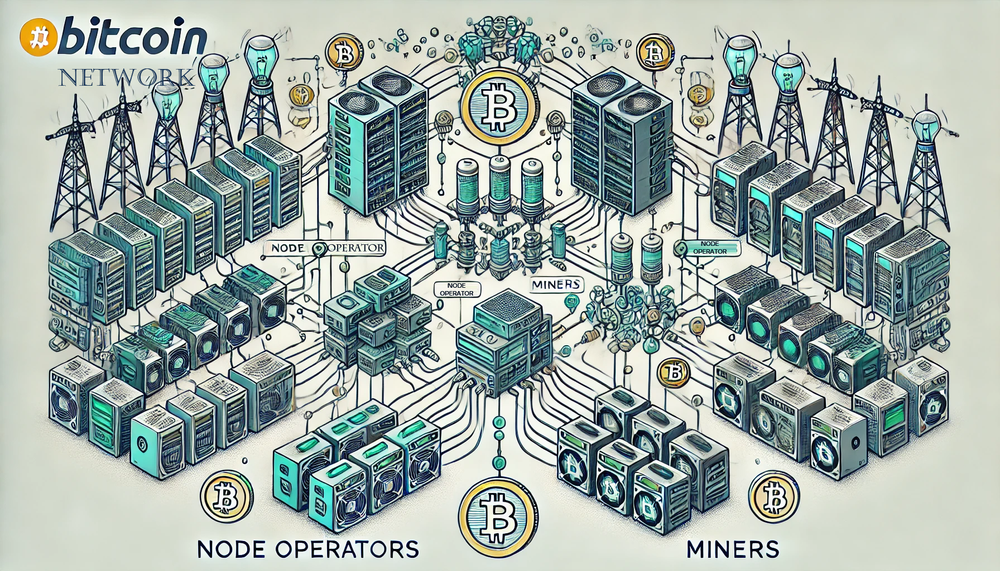Operators of Bitcoin Nodes and Miners: Roles, Functions, and Their Relationship

In the Bitcoin network, node operators and miners play crucial roles in maintaining security, decentralization, and efficiency. While they both work towards keeping the blockchain secure and valid, their functions and incentives differ. This article will explore the roles of each, the differences in their rewards, and how their relationship contributes to the decentralized and transparent nature of the Bitcoin network.
1. What is a Node Operator?
A node in the Bitcoin network is a computer running the Bitcoin Core software that stores a complete copy of the blockchain. There are two main types of nodes: full nodes and light nodes. Full nodes are responsible for verifying all transactions and blocks according to Bitcoin's protocol rules. These operators act as "rule keepers" within the network.
Tasks of Node Operators:
- Transaction and Block Verification: Nodes check whether every transaction and block received is valid according to Bitcoin’s protocol rules. If a transaction or block does not meet the criteria, it is rejected.
- Broadcasting Transactions and Blocks: Nodes are responsible for disseminating valid transactions and blocks to other nodes in the network.
- Maintaining Decentralization: Nodes contribute to the network's decentralization by ensuring no single entity can control the entire blockchain.
No Direct Monetary Rewards for Node Operators
Unlike miners, node operators do not receive direct monetary rewards in the form of Bitcoin. They do not participate in the Proof of Work (PoW) process that yields block rewards. Nevertheless, many choose to run nodes for various reasons:
- Full Control Over Their Own Transactions: By running their own node, users can verify and control their transactions without relying on third parties.
- Enhanced Privacy: Operating their own node gives users greater privacy when transacting in Bitcoin.
- Supporting the Network: Node operators play a critical role in maintaining network decentralization and security.
2. What is a Miner?
Miners are entities participating in the Bitcoin mining process through the Proof of Work algorithm. Their task is to solve complex mathematical puzzles to discover new blocks. Once a block is found, miners fill it with valid transactions and add it to the blockchain. In return, they receive block rewards and transaction fees.
Tasks of Miners:
- Collecting Transactions: Miners take valid transactions from the mempool (a pool of unconfirmed transactions) and verify them before adding them to a block.
- Mining New Blocks: This involves solving a complex mathematical puzzle to find a valid hash, allowing the new block to be added to the blockchain.
- Securing the Network: By competing to mine new blocks, miners contribute to the security and integrity of the Bitcoin network. They ensure new transactions are verified in a decentralized and secure manner.
Incentives for Miners
Miners earn rewards in the form of:
- Block Rewards: Newly mined Bitcoin as a reward for each new block added to the network. This reward decreases over time through a process known as halving.
- Transaction Fees: Miners also earn fees paid by Bitcoin users for processing their transactions.
3. The Relationship Between Node Operators and Miners
Despite differences in their functions and incentives, node operators and miners work together to maintain the Bitcoin network. Here is how their relationship functions:
- Validating Transactions and Blocks
- Nodes receive, verify, and broadcast new transactions. Miners listen to nodes for valid transactions and verify them before adding them to the blocks they mine.
- If a miner attempts to mine a block with invalid transactions, nodes will reject that block. This ensures that only transactions adhering to protocol rules can be added to the blockchain.
- Broadcasting New Blocks
- After miners successfully mine a new block, they broadcast it to the network. Nodes receive and verify the block. If it is valid, it is further broadcasted by nodes throughout the network.
- Nodes act as guardians and quality controllers, ensuring no manipulation or rule-breaking occurs.
- Forming Consensus
- Nodes and miners work together to maintain consensus within the network. Miners generate new blocks, while nodes ensure those blocks are valid according to Bitcoin's protocol rules. This creates a balance of power that keeps the network secure and decentralized.
4. Pros and Cons of Each Role
Advantages of Node Operators:
- Complete Control over their own transactions.
- Higher Privacy compared to users relying on third-party nodes.
- Contribution to network decentralization and security.
Disadvantages of Node Operators:
- No direct rewards like miners.
- Costs involved in running a node, including computing power and data storage.
Advantages of Miners:
- Monetary rewards through block rewards and transaction fees.
- Contribution to network security and blockchain growth.
Disadvantages of Miners:
- High investment required for hardware and energy.
- High competition within the network, which can impact profitability.
Conclusion
Node operators and miners are essential components of the Bitcoin ecosystem, each playing a crucial role in maintaining the network's security, integrity, and decentralization. Though their roles differ, their collaboration ensures that Bitcoin remains a transparent, secure, and decentralized network. The difference in incentives reflects distinct needs within the ecosystem, yet together they form a robust foundation for this digital currency.
This article presented by Loka Mining.
Loka is revolutionizing the Bitcoin mining ecosystem by directly connecting investors with Bitcoin miners through a decentralized mining pool and an upcoming permissionless forward hashrate marketplace protocol.
Loka enables investors to get Bitcoin at lower than market price without centralized & counter-party risks, and Bitcoin miners to access capital efficient financing and hedge their risk exposure by selling their future mining rewards.
Find out more about loka in https://lokamining.com — or access our mining pool aggregator on https://pool.lokamining.com
